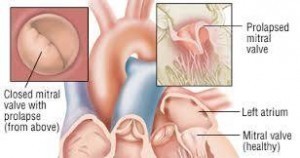NCLEX Mitral Valve Prolapse
NCLEX Mitral Valve Prolapse
Mitral valve prolapse (MVP) (a.k.a. floppy mitral valve syndrome, systolic click murmur syndrome or billowing mitral leaflet) is a valvular heart disease characterized by the displacement of an abnormally thickened mitral valve leaflet into the left atrium during systole. It is the primary form of myxomatous degeneration of the valve. There are various types of MVP, broadly classified as classic and nonclassic. In its nonclassic form, MVP carries a low risk of complications and often can be kept minimal by dietary attention. In severe cases of classic MVP, complications include mitral regurgitation, infective endocarditis, congestive heart failure, and, in rare circumstances, cardiac arrest.
The mitral valve, so named because of its resemblance to a bishop’s mitre, is the heart valve that prevents the backflow of blood from the left ventricle into the left atrium of the heart. It is composed of two leaflets, one anterior and one posterior, that close when the left ventricle contracts.
Each leaflet is composed of three layers of tissue: the atrialis, fibrosa, and spongiosa. Patients with classic mitral valve prolapse have excess connective tissue that thickens the spongiosa and separates collagen bundles in the fibrosa. This is due to an excess of dermatan sulfate, a glycosaminoglycan. This weakens the leaflets and adjacent tissue, resulting in increased leaflet area and elongation of the chordae tendineae. Elongation of the chordae tendineae often causes rupture, commonly to the chordae attached to the posterior leaflet. Advanced lesions—also commonly involving the posterior leaflet—lead to leaflet folding, inversion, and displacement toward the left atrium.
Signs and Symptoms
- A racing or irregular heartbeat (arrhythmia)
- Dizziness or lightheadedness
- Difficulty breathing or shortness of breath, often when lying flat or during physical activity
- Fatigue
- Chest pain that’s not caused by a heart attack or coronary artery disease
Causes
When your heart is working properly, the mitral valve closes completely during contraction of the left ventricle and prevents blood from flowing back into your heart’s upper left chamber (left atrium).
But in some people with mitral valve prolapse, one or both of the mitral valve’s flaps (leaflets) have extra tissue bulging (prolapsing) like a parachute into the left atrium each time the heart contracts.
This may not cause problems if only a small amount of blood leaks back into the atrium. More severe mitral valve regurgitation can cause symptoms such as shortness of breath, fatigue or lightheadedness.
Another name for mitral valve prolapse is click-murmur syndrome. When a doctor listens to your heart using a stethoscope, he or she may hear a clicking sound as the valve’s leaflets billow out, followed by a murmur resulting from blood flowing back into the atrium. Other names to describe mitral valve prolapse include:
- Barlow’s syndrome
- Floppy valve syndrome
- Balloon mitral valve
- Billowing mitral valve
- Myxomatous mitral valve
- Prolapsing mitral valve syndrome
Risk Factors
Mitral valve prolapse can develop in any person at any age. Serious symptoms of mitral valve prolapse tend to occur most often in men older than 50.
Mitral valve prolapse can run in families and may be linked to several other conditions, such as:
- Marfan syndrome
- Ehlers-Danlos syndrome
- Ebstein’s anomaly
- Muscular dystrophy
- Graves’ disease
- Scoliosis
Complications
Although most people with mitral valve prolapse never have problems, complications can occur. They may include:
- Mitral valve regurgitation. The most common complication is a condition in which the valve leaks blood back into the left atrium (mitral valve regurgitation).
Being male or having high blood pressure increases your risk of mitral valve regurgitation. If the regurgitation is severe, you may need surgery to repair or replace the valve in order to prevent the development of complications, such as stroke.
- Heart rhythm problems (arrhythmias). Irregular heart rhythms can occur in people with mitral valve prolapse. These most commonly occur in the upper chambers of the heart, and while they may be bothersome, they aren’t usually life-threatening. People with severe mitral valve regurgitation or severe deformity of their mitral valve are most at risk of having serious rhythm problems, which affect blood flow through the heart.
- Heart valve infection (endocarditis). The inside of your heart contains four chambers and four valves lined by a thin membrane called the endocardium. Endocarditis is an infection of this inner lining. An abnormal mitral valve increases your chance of getting endocarditis from bacteria, which can further damage the mitral valve. The risk is higher in older men. Doctors used to recommend that some people with mitral valve prolapse take antibiotics before certain dental or medical procedures to prevent endocarditis but not anymore. The American Heart Association advises that antibiotics aren’t necessary in most cases for someone with mitral valve regurgitation or mitral valve prolapse.
Treatments
Most people with mitral valve prolapse, particularly people without symptoms, don’t require treatment.
If you have mitral valve regurgitation but don’t have symptoms, your doctor may suggest you return regularly for follow-up examinations to monitor your condition, depending on the severity of your condition.
If you develop symptoms, your doctor might prescribe certain medications to treat mitral valve prolapse-related chest pain, heart rhythm abnormalities or other complications. Some medications you might be prescribed include:
- Beta blockers
- Diuretics
- Heart rhythm medications
- Aspirin
Surgery
- Valve Replacement or Repair
NCLEX National Exam Courses
Overview
- Elite Reviews Offers A Variety Of Online Courses That Will More Than Adequately Help Prepare The Graduate Nurse To Pass The National Exam.
- Each Course Includes Sample Questions & The Most Current NCLEX Exam Updates.
NCLEX Free Trial
- FREE Sample Lecture & Practice Questions
- Available For 24 Hrs After Registration
- Click The Free Trial Link To Get Started – NCLEX Free Trial
How It Works
How The Course Works
- First – Purchase The Course By Clicking On The Blue Add To Cart Button – You Will Then Be Prompted To Create A User Account.
- Second – After Creating An Account, All 3 Options (90, 120, 150 Days) Will Be Listed. Select The Option You Desire And Delete The Other Two.
- Third – You Will Be Prompted To Pay For This Review Using PayPal – After Payment You Will Be Redirected Back To Your Account.
- Last – Click The Start Button Located Within Your Account To Begin The Course
- 175 Prep Questions
- Q & A With Rationales
- Alt. Format Questions
- 90 Days Availability
- Cost $75.00
- 1250+ Prep Questions
- Q & A With Rationales
- Alt. Format Questions
- 90 Days Availability
- Cost $200.00
NCLEX Practice Questions Bundle
- 1350+ Prep Questions
- Q & A With Rationales
- Alt. Format Questions
- 90 Days Availability
- Cost $225.00
NCLEX Review Course
- Option 1
- Lectures & 1250+ Questions
- Q & A With Rationales
- Alt. Format Questions
- 90 Days Availability
- Cost $275.00
- Option 2
- Lectures & 2000+ Questions
- Q & A With Rationales
- Alt. Format Questions
- 90 Days Availability
- Cost $325.00
NCLEX Review Course Bundle
- Option 3
- Lectures & 3000+ Questions
- Q & A With Rationales
- Alt. Format Questions
- 90 Days Availability
- Cost $375.00






